- On this day 20 years ago a demonstration in Prague marked the beginning of the Velvet Revolution, ending communist rule. (via @PragueBob) #
Powered by Twitter Tools
Powered by Twitter Tools
Powered by Twitter Tools
Before I lay me down to sleep…
I find the CNN overview of the night’s festivities to be very good: lots of videos and a slideshow.
Sehenswert, as the Germans would say. (“Worth a look”.)
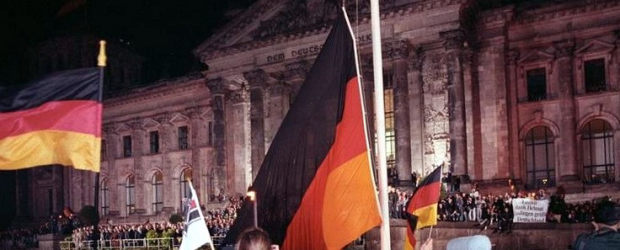
Well the day has finally come, the 20th Anniversary of the Fall of the Berlin Wall.
We’ve put up a lot of Wall-related posts over the last several weeks in preparation for today, including our Fall of the Berlin Wall Resources page, as well as several individual entries in our Berlin Wall content category.
Now it’s just time to sit back and enjoy the celebrations on the telly. Those of you in Germany and Austria should tune in to Phoenix for the most coverage. Others around the world will no doubt be checking out major international networks such as CNN and the BBC.
Enjoy the coverage and see you back here soon!

Bill Dawson
Photo Credit: The lead photo accompanying this blog post is from the German Federal Archives, which has made it available under the Creative Commons Attribution Share-Alike license via Wikimedia Commons.
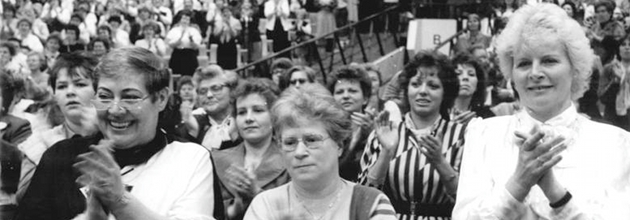
In Part One of my overview of Mary Fulbrook’s The People’s State: East German Society from Hitler to Honecker (Amazon US, UK, CA, DE [english] and DE [deutsch]), I emphasized Professor Fulbrook’s assertion that most histories of East Germany concentrate on the “state versus society” angle, seeing the latter wholly as a repressed body governed and repressed by the former. As she makes clear in her introduction to the book, she believes the “state versus society” approach is unnecessarily and unnaturally limiting; a history that focuses only on the East German regime’s repression of dissent is, to some extent, ahistorical.
I also mentioned that in pursuing her newer, wider and, as she believes, more correct approach to East Germany’s history, Fulbrook appears to be at least somewhat worried that her own politics can be used against her, that she might be seen by some as downplaying the repressive elements of the dictatorship. As I noted, she therefore goes out of her way on several occasions to remind the readers that the regime was, in fact, a repressive dictatorship. (By the way, she makes this clear enough in another of her books concerning East Germany, Anatomy of a Dictatorship.)
Given her stance — and her own worries about how her stance might be received — I was really wondering just how far she would go in describing what we might call a “contented people” (not her phrase) in the later parts of the book where her arguments would be spelled out in greater detail. Let’s be specific here: I was asking myself, “Am I maybe going to come away thinking that East Germany wasn’t such a bad place?”
Having now read up to the book’s conclusion — and most importantly the section with the eyebrow-raising title, “The Participatory Dictatorship” — I can say that rather than getting the sense of any kind of contentment experienced by East German citizens, I instead come away with a much greater understanding of what could be considered “coping“: how most East Germans settled into the system, became a part of it and recognized their own limitations as to what they could change about it. So one of my overall reactions is that Professor Fulbrook probably did not need to worry too much that what she wrote would be considered a diminution of the repressive elements of East German society. I can say with certainty that in sections such as “The Participatory Dictatorship”, I did not feel in any way that Fulbrook plays down the repressive nature of the regime.
Rather, she simply provides a very interesting and thought-provoking description of how, in fact, the “State versus Society” model hardly existed. The State was the Society. How’s that?
The regime did a truly remarkable job integrating the society into the state by widening — to an extraordinary degree — the group of stakeholders who had something to benefit from the state. And I’m not just talking “benefits” in the form of health and education, but rather more in the form of making individuals feel that they are part of the state’s governance by providing them with responsibilities, no matter how pathetic (in retrospect) some of these responsibilities might seem. Much of this was simply manipulation, but a very clever manipulation indeed. That handful of people who truly held power at the top of the regime understood very clearly that they needed to give people a sense of (limited) power — or the appearance of power — to influence their local surroundings.
To that end, vast numbers of people were given some sort of “functionary” role. (The notion of “functionary” is very prominent in Chapter 11.) Fulbrook:
Implausibly large numbers — perhaps one in six of the population — were involved in one way or another in what might be called the micro-systems of power through which the GDR society worked. This system cannot be described in terms of an extended “state” that was “doing something” to a “society” conceived of as separate from the “state”: rather it was the very way society as a whole was structured. Life in the GDR, in just about every respect — including not only the obvious areas of the economy or the education system, but also housing and leisure — was organised in ways that were at the same time dependent on central policy decisions and on the practices of innumerable people who were active participants in the maintenance and functioning of the system on the ground.
Among them were 300,000-400,000 “key functionaries”, but then also another two million adults who
played a significant role as a functionary in one or more of the mass organizations, political parties and regional and local representative institutions such as the Stasi, the Army and the People’s Police, and the state administrative and economic apparatus.
…
[T]o try to call them all representatives of the “state”, rather than members of “society”, would be to make an artificial distinction that does not adequately depict the situation on the ground.[236-237]
She goes on to describe some of the “enormous number of functions” a citizen of the GDR could potentially hold. But it’s very important to note that she does not present this as some sort of ideal circumstance, as if it was “finally” a state in which “the people” could actively participant. I found her to be describing a rather more pathetic situation, though I’m not sure she would characterize it as such. For example, the “functionaries” would — unsurprisingly — use their functions as proof of commitment to the regime when asking (begging) for items of scarcity, such as apartments or management jobs. A certain type of class system emerged in this “classless” society.
She refers to the functionaries described above as a “benign” form of participation. That group was large enough as is, but we’ve not yet touched upon the “malign exercises of power” that could be undertaken by everyday members of society who, sadly, jumped at the opportunity. We’re speaking here of the informal collaborators (inoffizielle Mitarbeiter, or “IMs”) who worked with the Stasi, the notorious East German secret police. Fulbrook:
By way of comparison, the Gestapo employed 7,000 officials for a total population of 66,000,000 in Nazi Germany; the Stasi employed over 91,000 full-time staff in a GDR population of about 16,400,000 in 1989. [241]
And those were simply the official employees of the Stasi. By the 1980s there were 170,000-180,000 informal collaborators, “an average ratio of one informer to every 60 or so adults.” Given the turnover of IMs over the years, she estimates that a half million GDR citizens were informal collaborators of the Stasi during the Honecker years. So this was yet another and more sinister way in which society and state overlapped during the second German dictatorship.
Fulbrook’s The People’s State (UK, CA, DE [english] and DE [deutsch]) is full of interesting data such as the numbers I’ve just showed you. I believe she makes good use of the data and, overall, I found her argument very convincing. She need not have worried too much about her arguments being misinterpreted from a political perspective: I experienced the book as a series of very thorough empirical examinations followed up by completely plausible interpretations.
It’s dense stuff, meant (I imagine) not so much for a casual audience but rather for university study. Nevertheless, Fulbrook’s writing is very approachable — it’s only the detail that I think might put off the casual reader. Professor Fulbrook is very thorough! Personally, I like that.
Happy Reading!

Bill Dawson
P.S. For a dramatic interpretation of the methods of the Stasi — the East German secret police — check out the Oscar-winning film “The Lives of Others” (also available at Amazon UK, CA and DE). For a foreign-language film, “The Lives of Others” has an extraordinary 270+ reviews at Amazon.com, almost wholly positive. Here’s part of one:
‘The Lives of Others’ is 137 minutes of the best entertainment imaginable. Ulrich Mühe is an East German who himself was the target of Stasi oversight. For this film, he was awarded Best Actor at the 2006 European Film Awards. Is there a more just triumph than that?
The lead photo accompanying this blog post is from the German Federal Archives which has kindly made it available via Wikimedia Commons under the Creative Commons Attribution Share Alike license. The photo shows participants of the Bundeskongress of the German League of Democratic Women (DFD), one of the many organizations that would have been in a position to provide “functionary” roles as described by Professor Fulbrook.
 #
# Time to take a class somewhere, just to get access! #
Time to take a class somewhere, just to get access! #Powered by Twitter Tools
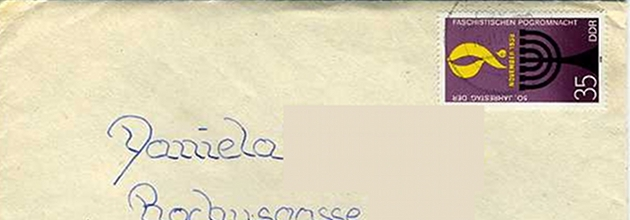
Amateur history nerd that I am, I’m quite pleased to have married into a family which has retained all sorts of books, newspapers and magazines dating from about 1920 onwards. The “In the Hausarchiv” series gives an occasional look at the things I’ve come across in our own “house archive”.
Last time I featured a letter from an East German penpal of my wife. I’m going to do the same again in this post, though this letter comes from a different young man in East Germany.
The first thing that caught my eye was the postage stamp. It commemorates the 50th anniversary of what has commonly been referred to as “Kristallnacht“, or “The November Pogrom”. On this East German stamp it is called the “Fascist Pogrom Night”. This is factually true, but I had to laugh a bit because it’s a very, very East German (communist) way of putting it. The regime in East Germany went to great lengths to define itself as anti-fascist. The Berlin Wall itself was officially named the “Anti-Fascist Protection Wall.”
 But now let’s get to the good stuff, the words written by this young man. If you look at the bigger version of the note (click on it), the top of the right-side reads as follows:
But now let’s get to the good stuff, the words written by this young man. If you look at the bigger version of the note (click on it), the top of the right-side reads as follows:
A week ago we had a very nice yet sad farewell party. Two couples whom I know well have finally received their permit to emigrate to West Germany, after three years of waiting.
…
Such a farewell was definitely sad, but we’re all agreed that someday the walls will fall and we’ll all see each other again. I’m so looking forward to that.
I confess that those words stirred me emotionally. The letter is undated and the postmark is unclear, but from the content (he speaks of the “new year”) I assume it was written in January of 1989. Fortunately he only had another 10 months to wait before being able to go to the West and visit his friends.
I hunted through other letters from this particular young man and found one which stirred me even more. It contains this fantastic passage:
On 18 and 19 June [1988], Fisher-Z, Marillion, Heinz-Rudolf Kunze, Big Country and the absolutely awesome BRYAN ADAMS played in East Berlin. And so I went with my friends to Berlin for the very first time. I was absolutely overwhelmed and I’m still processing it all now. It started even before we reached Berlin. There I was driving comfortably in the car and all of a sudden there was a deafening roar above us: a Pan Am jet landed at the airport next to the Autobahn. I’ve seen it a thousand times on television, but when you actually experience it it’s really something.
Then we went with the S-Bahn [regional train] and suddenly there were giant white skyscrapers. Jan nudged me and said that that was West Berlin. I said loudly, “You’re crazy, that’s not West Berlin. They would never let us get so close!” A woman across from me smiled and said, “Just wait, young man. In a second you’ll see the Wall — it really is West Berlin.”
And then I saw it, the Wall and watchtowers, and shivers ran down my spine [mir lief es eiskalt den Rücken runter]. Dani, I’m sure you’ve heard much about the Wall just like I have, but when you’re standing right in front of it — you just can’t imagine what a feeling it is, you can hardly believe it’s real: freedom so close, yet so far. [so nah die Freiheit und doch so weit].
…
I’ve never seen such a concert live; it was a beautiful high point of my life.
Until next time,

Bill Dawson
P.S. Don’t forget to check out my Berlin Wall resources page!
P.P.S. The concert is mentioned in an interesting English-language article at the website of the German magazine Der Spiegel.
Dear Readers,
I will be on vacation from about 18 November to 10 December 2009, so during that time I expect my content here at the blog will be a bit on the light side.
Are you interested in submitting a potential guest post to me for consideration? If it fits good with the subject matter of this blog, I would love to schedule it for posting during my vacation time.
It doesn’t have to be totally history-related. For example, with Christmas coming up it could be something about German or Austrian Christmas traditions.
If you have a topic idea, feel free to e-mail me or post a comment here. In case you want to e-mail, I’ll obscure my e-mail address here a bit to avoid e-mail address harvesters: it’s my name (“bill”) at the name of this domain, which as you know is “germanhistoryblog” dot com.
Until next time,

Bill Dawson

This is a guest post from Bill Dawson, who writes regularly about topics concerning German History. Given the upcoming anniversary, he is spending a lot of time particularly on the topic of the Fall of the Berlin Wall. [etc…]
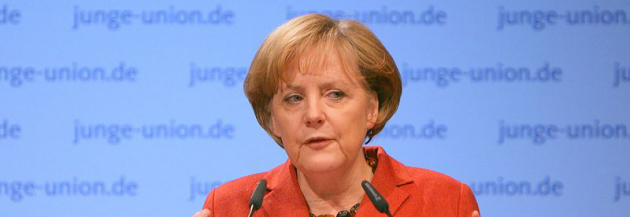
Here are links for 03 November 2009 concerning that very important moment in German History (and world history), the fall of the Berlin Wall. The 20th anniversary of that momentous event is coming up in just six days, on 09 November 2009.
If you missed them, consider reviewing other recent entries containing links regarding the anniversary of the Fall of the Berlin Wall. And don’t forget our special page dedicated wholly to Fall of the Berlin Wall Resources.
And now to today’s links:
Unfortunately, today’s video is not “embed-able” in my page, so you’ll have to head on over to the BBC to watch it. It’s part of native German Franz Strasser’s trip through the areas of his former country, East Germany. In this episode, Strasser talks with German students who belong to the first generation that grew up during reunification. Interesting!
I hope you enjoyed today’s links. Keep coming back for more!
Until next time,

Bill Dawson
P.S. Chancellor Merkel is right at the top of the list of the world’s most powerful women. She’s very modest in public and comes across as a bit of an intellectual (which she is); words like “dynamic”, which we often like to ascribe to leaders, don’t necessarily apply to her. But this makes her no less of an extraordinary woman, one who has a very interesting biography, as that Independent article suggests.
There are English-language biographies of this “Power-Frau“, such as the one I’ve highlighted here. Check it out!
The lead photo accompanying this blog post shows German Chancellor Angela Merkel and comes from Wikimedia Commons, where it was graciously made available by Jacques Grießmayer under the Creative Commons Attribution Share Alike 3.0 license.

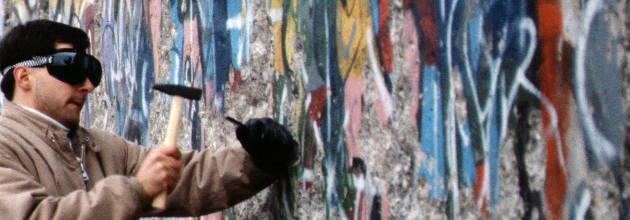
So you vaguely recall hearing something about an upcoming anniversary in Germany, but you’re embarrassed to admit that you don’t really know what all the hoopla is about. Sure, you know Berlin is the capital of Germany, and you’ve come across the notion of some kind of “Wall” being there, but that’s about the extent of your knowledge.
That’s what I’m here for, to help you learn a bit o’ history. Here are three links to help you understand what this upcoming anniversary is all about:
And now for a little bonus. Do you want to “feel” the Berlin Wall, in an emotional sorta way? I find the video below to be absolutely goose-bumpy! It features video clips concerning the Wall, accompanied by the song “Wind of Change” from the German band The Scorpions. The song is relevant: it was written with the revolutions of 1989 in mind. Put on your headphones, turn up the volume, kick back and immerse yourself in the Berlin Wall experience:
No excuses! Now you know about that infamous Wall and you’re prepared to talk about it in the coming week!

Bill Dawson
P.S. You can always read a book, too, if you find yourself more interested! Here is one wholly dedicated to the topic of the Berlin Wall. The book came out this year specifically because of the 20th Anniversary of the Fall of the Berlin Wall, which is celebrated on 09 November.
It’s Jeffrey Engel’s The Fall of the Berlin Wall: The Revolutionary Legacy of 1989. That link is for Amazon.com, but the book is also available via Amazon UK, Canada and Germany.
The photo of the Berlin Wall that accompanies this blog post is from Flickr user “vivaopictures”, who has graciously made it available to all of us via the Creative Commons Attribution Share Alike license. The suggested attribution is as follows: